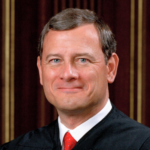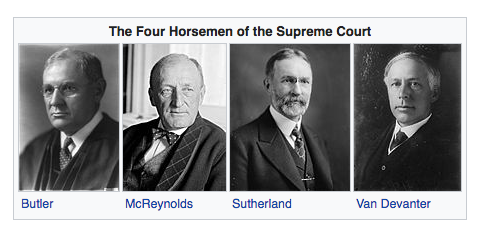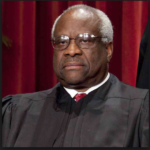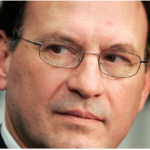Corey Robin's Blog, page 23
July 9, 2018
The Five Horsemen of the Apocalypse
During the Roosevelt Administration, they were known as the Four Horsemen (of the Apocalypse). They were Justices Butler, McReynolds, Sutherland, and Van Devanter. They voted, again and again, against the New Deal.
This is what they looked like.
Tonight, with Trump’s choice of Brett Kavanaugh, we have the Five Horsemen. They are Chief Justice Roberts and Justices Thomas, Alito, Gorsuch, and, once he’s confirmed, Kavanaugh. They will vote, again and again, against whatever progressive legislation Congress and the states manage to pass in the future.
This is what they look like.

July 6, 2018
Did Anthony Kennedy ever sniff glue? And other stories of nominations past
Last week, after Anthony Kennedy announced his retirement from the Supreme Court, Donald Trump declared, “Outside of war and peace, of course, the most important decision you make is the selection of a Supreme Court judge.” As we await Trump’s announcement on Monday of this most important decision, let’s take a gander at the history of nominations past.
1. In 1990, when George H.W. Bush was casting about to replace retired Supreme Court justice William Brennan, the consensus candidate in the White House was Ken Starr.
2. Starr got nixed by Dick Thornburgh, who was Bush’s Attorney General. Thornburgh thought Starr was too much of a squish, not sufficiently hard-right, especially about presidential power.
3. Today, Thornburgh is one of Trump’s most prominent conservative critics, claiming that Trump poses a radical threat to the rule of law and Republican values.
4. Bush settled on David Souter as his nominee.
5. Three years earlier, the Reagan White House had briefly considered Souter after Robert Bork’s nomination went down in flames.
6. Souter was scotched when Reagan’s people discovered he had joined a New Hampshire Supreme Court decision declaring that gay men and women had a constitutional right to run day-care centers.
7. Reagan settled on Anthony Kennedy instead.
8. Kennedy was considered safe. He offered the Reaganites reassuring answers to literally hundreds of questions about his personal life.
9. Among other questions, Kennedy was asked:
Did he have sex in junior high?
If he had sex in college, where did he do it?
Had he ever had sex with another man?
Did he ever have kinky sex?
Had he ever had herpes?
Did he sniff glue?
10. This is how constitutional law gets made. Before the norms eroded.
July 4, 2018
How eerie and unsettling it can be when people change their minds: From Thomas Mann to today
In the wake of the victory of Alexandria Ocasio-Cortez, a number of people have been commenting, complaining, celebrating, noticing how quickly mainstream liberal opinion—in the media, on social media, among politicians, activists, and citizens—has been moving toward Sanders-style positions. And without acknowledging it. Positions, policies, and politics that two years ago were deemed beyond the pale are now being not only welcomed but also embraced as if the person doing the embracing always believed what he or she is now saying.
This, as you can imagine, causes some on the left no end of consternation. For some legitimate reasons. You want people to acknowledge their shift, to explain, to articulate, to narrate, perhaps to inspire others in the process. And for some less legitimate, if understandable, reasons: people are pissed at the way Sanders-style politics was attacked in 2016 and want folks to own up to it. Understandable, from a human point of view, but not really the way you build a coalition or a movement. If the left is going to grow, everyone should be welcome to join, without having to hand over a bill of lading upon their arrival.
But I’m not bringing this up to settle scores or to enforce some kind of norm of the welcome mat. I’m actually just super interested in this phenomenon, in this kind of change at the both the human and the political level. By “this kind of change” I don’t meant the deep transformations that a fair number of political people undergo over the course of a lifetime: the proverbial migration from left to right, for example, that we saw throughout the 20th century. That’s a deep, one-time change that you don’t easily go back from. I mean more these micro-shifts that happen under the pressure of events, the subtle coercions of new opinion, the ever-finer movements to keep up with where things are going, so as not to be left behind.
I just finished reading Thomas Mann’s letters, and Mann in many ways is an exemplary figure in this regard. Leading up to World War I, he was a fairly standard old-school conservative militarist/nationalist. That continued until the end of the war. After the war, he slowly became a dedicated liberal defender of Weimar. Once the Nazis took over, his liberalism morphed into staunch anti-fascism, humanist in its outlook. By the end of the war, that antifascism had come to include overt sympathy to communism and the Soviet Union (he even praised Mission to Moscow on aesthetic grounds!). That continued into the late 1940s, when he supported Henry Wallace for president and was outspoken in his opposition to HUAC and defense of the Communist Party in Hollywood and elsewhere.
But then, around 1950 or so, you see, ever so slightly and subtly, Mann’s opinions starting to change once again. He never comes out in defense of McCarthyism, but he slowly starts becoming more critical of the CP, of the Soviet Union, and less critical of the repression. Till finally, in a 1953 letter to Agnes Meyer, his close friend and matriarch of The Washington Post, he confesses that he has decided not to publicly oppose McCarthyism. He reports to her that when he was asked—”probably by someone on the ‘left'”—what he thinks about the censorship and restrictions on freedom in the US, he replied, “American democracy felt threatened and, in the struggle for freedom, considered that there had to be a certain limitation on freedom, a certain disciplining of individual thought, a certain conformism. This was understandable.”
It just about broke my heart. That “left” in scare quotes (previously he had seen himself as a part of the left), the clichéd endorsement of Cold War confinement, the betrayal of all that he had said and done in the preceding decades—and most important of all, the seeming inability to see that he was betraying anything at all.
Who was the real Thomas Mann? The German militarist, the Weimar liberal, the humanist antifascist, the Popular Fronter, the Cold War liberal? Who knows? All of them, none of them? I think in the end, his most authentic moment was probably in his combination of Weimar liberal and early antifascism, with its humanism. That was the one true shift (from early militarist to humanist liberal anti-fascist) that he could endure and narrate. But the rest of those shifts? That was just the way the game was being played. As the climate of opinion changed during the war, he changed with it. And then at the onset of the Cold War, he changed again. But watching how his positions changed—within a very short period of time—without him even realizing it, without him even remembering what he had said, a mere three years prior, was eerie and unsettling. And heart-breaking, as I said.
During the McCarthy years, Arendt wrote in a letter to Jaspers how terrified she was of the repression. Not just the facts of it but by how quickly the mood of the moment had gone from a generous and capacious liberalism to a cramped anticommunism. “Can you see,” she wrote, “how far the disintegration has gone and with what breathtaking speed it has occurred? And up to now hardly any resistance. Everything melts away like butter in the sun.”
We’ll never know what combination of incentives and forces and genuine beliefs are at play in one person’s shifting positions. And like I said, I welcome the change that is happening today. But I would be less than honest if I didn’t say that I was sometimes unsettled by it. Particularly when it’s unacknowledged.
Intellectuals like to think of themselves as above this kind of thing, but I think we’re especially prone to it. Intellectuals live in the world of ideas, with an emphasis on that word “world.” The world is not what goes on in our heads; it’s what’s happening out there, between heads. Intellectuals want to be in that space of the in-between (Arendt knew this more than anyone). They want to be in the swim. That can make them chameleons of the first order.
Intellectuals are probably not that different from anyone else in this regard, but they do like to take and defend positions as if they were emanations of pure reason. Or unblinkered empiricism. The proverbial “When the facts change, I change my mind. What do you do, sir?” Which always gets attributed to Keynes but was in all likelihood said by Paul Samuelson.
I confess I’m always suspicious of these “when the facts change” types. In part because the most pressing fact that seems to change people’s opinions is…other people’s opinions.
Among intellectuals, that doesn’t always lend itself to an honest narration of change. Just the opposite: it can become an ever-shifting, ever-more baffling, and often unacknowledged, litany of changes.
Not sure what there is to be said about that. Just noting how universal, if sometimes eerie, it is.
June 6, 2018
The Creative Class Gets Organized
The staff of The New Yorker—the people behind the scenes: editors, fact checkers, social media strategists, designers—are unionizing. They’ve even got a logo: Eustace Tilly with his fist raised. If you’re a loyal reader of the magazine, as I am, you should support the union in any way you can. Every week, they bring us our happiness; we should give them some back. They’re asking for letters of solidarity; email them at [email protected].
If you look at their demands, they read like a tableaux of grievances from today’s economy: no job security, vast wage disparities, no overtime pay, a lot of subcontracting, and so on.
The creative class used to see itself and its concerns as outside the economy. Not anymore.
A few years back, I read Ved Mehta’s memoirs of his years at The New Yorker under editor William Shawn. Shawn helped Mehta find his first apartment: he actually scouted out a bunch of places with a real estate broker and wrote Mehta letters or called him about what he had seen. Shawn got Mehta set up with a meal service. The money was flowing. Again, not anymore.
The sea change isn’t just economic; it’s also cultural.
When we first started organizing graduate employees at Yale in the early 1990s, we got a lot of hostility. And nowhere more so than from the creative class. People in the elite media really disliked us. Many of them had left grad school or gone to fancy colleges, and we may have reminded them of the people they disliked when they were undergrads. (Truth be told: sometimes we reminded me of the people I disliked when I was an undergrad.) In any event, they saw us as pampered whiners, radical wannabees, Sandalistas in seminars. It was untrue and unfair. It didn’t matter. Liberals have their identity politics, too.
As some of you know, my union experience didn’t end happily. I lost three out of four of my dissertation advisers. And two of them wound up writing me blacklisting letters. After that, I wrote a mini-memoir-ish essay about the whole experience. I had great ambitions to be a personal/political essayist; this was my first stab at the genre. Part of my dissertation had been on McCarthyism and the blacklist, so I wove that into my essay: the experience of writing a dissertation that I wound up living a version of in real life.
I shopped it around to The New Yorker. I even called a top editor there after they turned it down. He answered the phone. That’s how things rolled back then. It was an awkward conversation.
I sent the essay to another top magazine. An editor there read and rejected it. I can’t remember if we spoke on the phone or corresponded by mail, but I remember his objection clearly. He didn’t like my comparison between my being blacklisted and McCarthyism. McCarthyism, he said, was about people going to jail; my essay was about people losing jobs and careers (which had happened to one of my fellow unionists, a student of the conservative classicist Donald Kagan).
The editor, of course, was wrong about that. Relatively few people went to jail under McCarthyism. Thousands upon thousands, however, lost their jobs and careers. That’s what McCarthyism was: political repression via employment. It didn’t matter. He knew what he knew.
Fifteen years later, there was a union drive at the magazine where this editor worked. He led it. He was fired.
My piece wasn’t great; it should have been rejected. I was an amateur, and it needed work. But I can’t help feeling that some part of the disconnect back then—the easy ignorance and confident incuriosity that so often pass in the media for common sense—had to do with where the creative class was in the 1990s: liberal on everything but unions.
Again, not anymore.
May 19, 2018
Conservatism and the free market
National Review just ran a review of my book, which Karl Rove tweeted out to his followers.
The review has some surprisingly nice things to say. It describes The Reactionary Mind as “well researched and brilliantly argued” and praises my “astonishingly wide reading…masterly rhetorical abilities…wizardry with the pen.” But on the whole the review is quite critical of the book. Which is fine. I’ve gotten worse.
But I couldn’t help noticing the appositeness of this.
Here’s the National Review on my book:
At no point in his book does Robin make any effort to account for the influence of Enlightenment-era classical liberalism on modern conservatism….[Adam] Smith’s influence on later conservatives is ignored.
And here’s Bill Buckley, the founder of National Review (and the modern conservative movement), to me, as quoted in my book:
The trouble with the emphasis in conservatism on the market is that it becomes rather boring. You hear it once, you master the idea. The notion of devoting your life to it is horrifying if only because it’s so repetitious. It’s like sex.
May 15, 2018
Chatting with Chris Hayes
Chris Hayes, the MSNBC anchor, has launched a new podcast Why Is This Happening? The idea is to go beneath the headlines, to take the long view, to examine current events against the long arc of history. I’m really thrilled that Chris chose me as his first guest. We talked about Trump, conservatism, and The Reactionary Mind. Have a listen!
dein goldenes Haar Margarete, dein aschenes Haar Sulamith
May 13, 2018
What we talk about when we talk about sex in the academy
I have a piece in The Chronicle Review about a genre that has annoyed me for some time:
Every few years an essay appears that treats the question of sexual harassment in the academy as an occasion to muse on the murky boundaries of teaching and sex. While a staple of the genre is the self-serving apologia for an older male harasser, the authors are not always old or male. And though some defend sex between students and professors, many do not. These latter writers have something finer, more Greek, in mind. They seek not a congress of bodies but a union of souls. Eros is their muse, knowledge their desire. What the rest of us don’t see — with our roving harassment patrols and simpleminded faith in rules and regulators — is the erotic charge of education, how two particles of mind can be accelerated to something hotter. In our quest to stop the sex, we risk losing the sexiness. Against the discourse of black and white, these writers plea for complexity: not so that professors can sleep with their students but so that we can speak openly and honestly about the ambiguities of teaching, about how the most chaste pedagogy can generate a spark that looks and feels like — maybe is — sexual attraction.
I call this genre The Erotic Professor.
The latest addition is Marta Figlerowicz and Ayesha Ramachandran’s “The Erotics of Mentorship,” which recently appeared in the Boston Review. Like many practitioners of the genre, Figlerowicz and Ramachandran are professors of literature. (You’ll never find a professor of chemistry or demography among the authors of such pieces.) Also like many practitioners, they have a high estimation of the academy’s sexiness. “There are perhaps no places more vulnerable to the intertwining of work and romance,” they tell us, “than colleges and universities.” That belief, of course, reflects the happenstance of their being in the academy rather than any empirical comparison of the academy to other workplaces. The office romance is a ubiquitous feature of the culture, after all, its settings as various as a bar (Cheers), a detective agency (Moonlighting), a paper company (The Office), and an insurance firm (The Apartment).
…
One of the conventions of the genre, in fact, is for the erotic professor to imagine what her students must be feeling by reference to what she once felt, and then to state that feeling as if it were a universal law (“intellectual magnetism, a notoriously protean force, often shades into erotic attraction”), scarcely noticing that when she had that feeling, she was a student on her way to becoming a professor. What about the student on her way to becoming an HR rep? Or an accountant?
The question never arises because the real shadow talk of the erotic professor is not sex but class.
You can read more here.
May 5, 2018
Shabbos Reading
This morning, in shul, we read Leviticus 24, where, building up to the famous eye for an eye passage, the text says: “And he that kills any man shall surely be put to death. And he that kills a beast [belonging to another man] shall make it good; beast for beast.”
This afternoon, at home, I read the story of the Jewish writer Bruno Schultz, killed in 1942. Schultz, who lived in the Polish city of Drohobych, had come under the protection of Felix Landau, an officer in the SS. Schultz painted murals on the bedroom walls of Landau’s little boy. Landau liked to go on Jew-killing sprees in the Drohobych ghetto. On one such expedition, he murdered a Jewish dentist who had been under the protection of Karl Günther, another officer in the SS. Taking revenge, Günther hunted down Schultz in the streets. He shot him twice in the head. Explaining himself, Günther said to Landau, “You killed my Jew—I killed yours.”
April 12, 2018
On Democracy Now!
I was on Democracy Now! this morning, talking about Paul Ryan’s retirement, the fate of conservatism, and the teachers’ strikes across the country. My segment starts at the 39 minute mark.
Corey Robin's Blog
- Corey Robin's profile
- 155 followers









